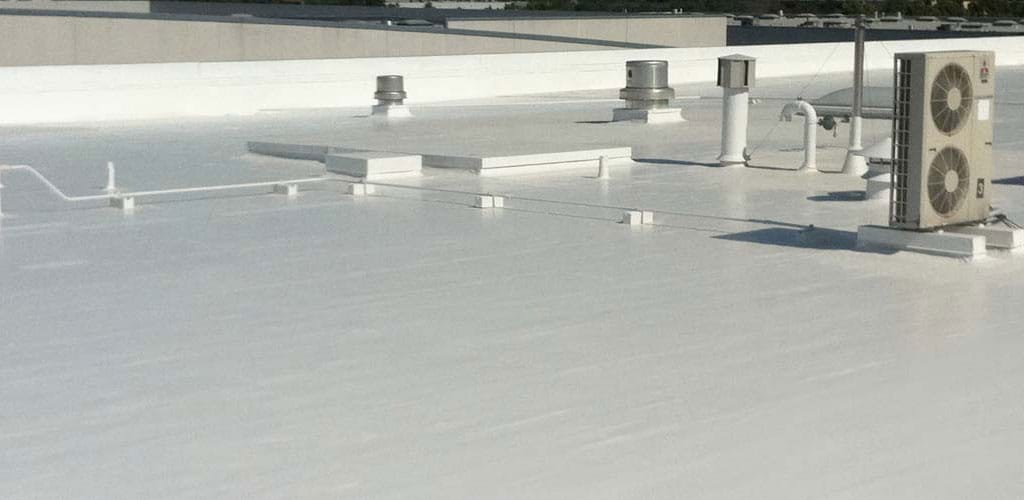FAQ
Recent Reviews from our Customers
What is a Roof Coating, exactly?

A roof coating is an extra layer of protection applied to an existing roof. This fluid roofing membrane can extend the life of a roof for up to 20 years.
Typically, roof coatings are designed to expand and retract together with roof materials depending on the weather conditions. By doing this, the coating remains unaffected and adhered to the roof to prevent creating a rupture in the membrane.
What type of roofs are Roof Coatings most frequently used on?
- Metal Roofs
- Flat Roofs
- Low Slope Roofs
Why is a Roof Coating a great idea to consider?
Roof coatings are:
- Eco-friendly (extremely minimal waste, making them an amazing green option)
- Durable (10-20 Year Warranties)
- Affordable (40-60% less than a full re-roof)
How expensive are Roof Coatings?
Roof coatings can be anywhere from 40-70% less expensive than the cost of a full re-roof.
A 7200 square foot roof coating we completed on Buckley Airforce Base would have cost the property owners a minimum of $100,000 for a full roof replacement. We were able to coat the roof for $40,000 and provide them a 20 year warranty.
How durable are Roof Coatings?
Roof coatings provide extremely durable protection against water and weather and offer anything from a 10-20 year warranty.

RCMA FAQs
*Below information taken directly from Roof Coatings Manufacturer Association (RCMA)
CAN I COAT A RUSTED METAL ROOF?
Rusted metal roofs can be coated after the rust conditions have been addressed. If the roof is “white rust” (zinc or aluminum) it can be coated after cleaning. If the roof is “red rust” the rust must be removed or treated with a corrosion inhibiting primer. All rusted fasteners should be treated or replaced.
IN WHAT WEATHER CONDITIONS CAN THE COATING BE APPLIED?
For water borne coatings, the ambient air temperature should be 50oF (10oC) and rising, with no rain for the next 24 hours. Solvent borne coatings can be applied in colder weather. As always, check with the coating manufacturer.
HOW DO I PREPARE THE ROOF SURFACE FOR COATING?
The roof must be thoroughly cleaned, and allowed to dry thoroughly. This is a critical step to ensure a successful coating application. Be careful not to damage the lap seams. Care should be taken when pressure washing not to disturb the integrity of the underlying roof membrane particularly where there are adhered seams. Refer to the specific coating manufacturer you are using for their specific requirements for roof preparation.
HOW IS THE COATING APPLIED?
The coating can be applied using spray, roller or brush.
HOW LONG DOES THE COATING TAKE TO DRY/CURE?
That depends on many factors: air temperature, wind, roof surface temperature, relative humidity (water borne coatings) coating color and the type of coating applied. For example, some coatings are moisture cured and thus humidity assists in its curing process.
HOW LONG WILL THE COATING LAST?
Based on long-term histories, typically the roof life of a properly applied roof coating can be extended up to 10 years or more. Performance can vary depending on type and conditions, as well as the coating film thickness.
CAN THE ROOF BE RECOATED IN THE FUTURE?
Yes. As the coating wears away, additional coating can be applied. Most coatings systems are renewable and sustainable. Refer to the specific coating manufacturer you are using for their specific requirements on re-coating applications.
DO I NEED A CONTRACTOR, OR CAN I DO IT MYSELF?
The coating can be applied by an experienced roof coatings applicator. A roofing contractor is strongly recommended if there are such issues as existing leaks, wet insulation, damaged deck, or manufacturers’ warranties.
WILL A REFLECTIVE COATING EXTEND THE LIFE OF MY ROOF?
Yes. The coating becomes the first layer of UV and waterproofing protection for the roof, and helps reduce expansion and contraction (thermal shock) of the roof.
HOW DO I MAINTAIN THE COATING?
It is recommended that the roof, including the coating, be inspected semi-annually and after a major storm or high wind “event”. Additional coating may need to be applied to repair damage to the coating and underlying roofing substrate. Check with the manufacturer and/or warranty program requirements.
WILL THE COATING STOP MY LEAKS?
While coatings may potentially stop minor leaks, the roof should be properly repaired and dried prior to coating application. Coatings may be able to seal pinhole leaks, which are leaks not visible to the naked eye. If the roof is leaking, the roof leak will need to be identified and repaired prior to any recoating; do not expect the coating to find and seal the leaks.
WHY SHOULD I GET MY ROOF COATED WITH A REFLECTIVE COATING?
Coating will extend the life of the roof, by reducing heat transfer into the building, decreasing thermal shock (thermal expansion and contraction of the roof membrane), and helping to mitigate leaks. Reflective coatings also can reduce heat energy costs and improve the aesthetics of the roof.
SHOULD I COAT A NEW ROOF OR NEARLY NEW ROOF?
Yes, a new roof should be coated if the building owner wants to add a highly reflective roof coating to reduce energy costs. The buyer should be aware of any warranties provided for a new roof that may violate that warranty during the period it is in force via the use of a roof coating. This will extend the roof’s service life. A reflective roof coating will reduce the heat load on the roofing assembly.
